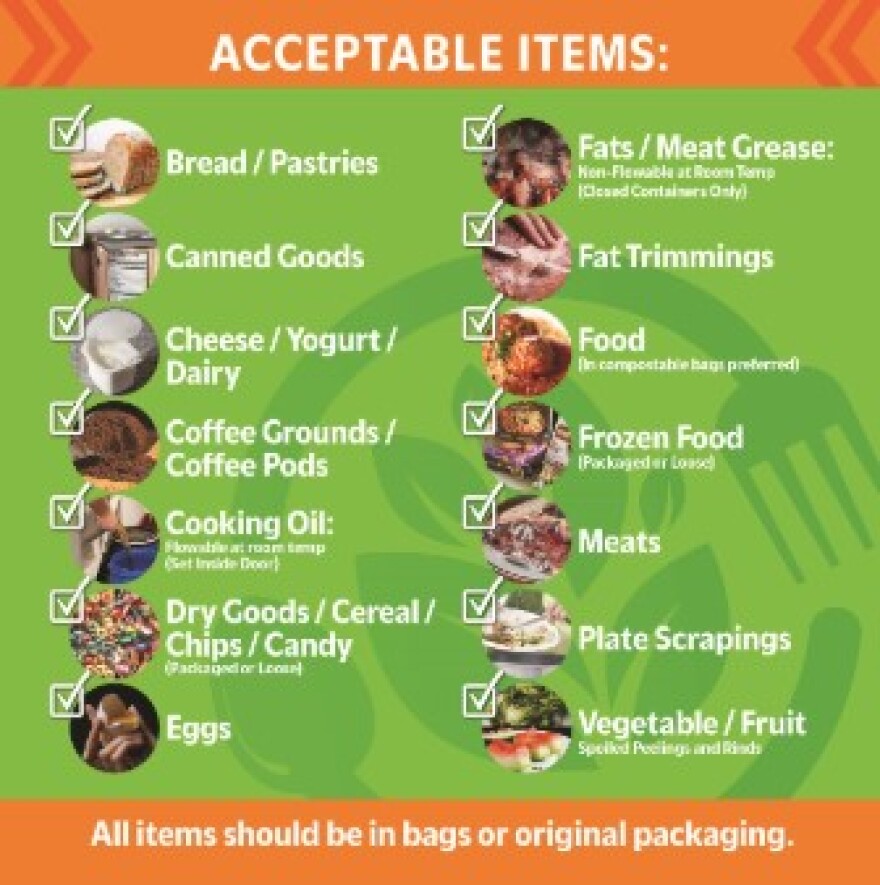The Muscatine Organics Recycling Center or MORC wants your food waste, even if it's stuck in a container.
Director of the Water and Resource Recovery Facility Jon Koch said MORC was an idea he had in 2015 while observing the center's digesters, liquid tanks that break down solids into fertilizer.
"We have anaerobic digesters that create methane gas, and that methane is used to fire boilers here at the city, but most of it is burned off, is flared off, as they say," Koch said in a phone interview with WVIK.
Koch looked at other municipalities using the biogas made from the digesters for city energy programs, but found that Muscatine's size would not be applicable for a similar program. So he pivoted to a different idea.

"I think we could find a way to make more biogas out of our digesters. And it turns out that adding food waste to digesters kind of makes them biogas powerhouses, where they actually just, it fires them up and they just start creating all kinds of biogas," Koch said. "So I started looking around to see where I could find food waste. And it turns out there's an awful lot of food waste out there, unfortunately."
Koch said about 25% of the waste going to Muscatine's landfills is organic. He noted that the USDA's Economic Research Service estimates that between 30 and 40% of food in America is wasted.
"So kind of hitting a lot of birds here with one stone, you know, where you can actually reduce the amount of landfilling that you do," Koch said. "You can reduce food waste going into landfills where that creates methane that goes off in the atmosphere. And we can capture that methane and make renewable energy out of it."
There are "floating lids" within the digesters that capture the methane and transport it to the facility's boilers. The heat created is used to power the digester, creating a self-sufficient process.
The city purchased a Turbo Separator T42, which removes food from packaging like aluminum and plastic.

"The food waste goes one direction and the packaging goes a different direction. And now you can take that food waste, slurry it up, and then you can add it to our digester," Koch said. Scott Equipment Company in New Prague, Minnesota, makes the T42. Koch stressed the machine can not handle glass and people should avoid placing glass in their organics recycling dropbox.
Koch said the service is free for residents, not just in Muscatine, but for anyone nearby.
"We have people from as far away as Bluegrass. We know, bring their food waste down here, and they like to have that ability so that it doesn't go in the landfill," Koch said.
Businesses will need to pay a $60 fee for each ton of waste dropped off.
"[T]he commercial and the industrial customers do pay a fee. And so the program is self-sufficient. It's self-sufficient that way in revenue that it generates through that tipping fee," Koch said.
Koch said since they started adding food to the digestors in 2020, they've created seven times the amount of biogas prior to the project. They take in over 4,000 tons of food waste annually, some from large businesses as far away as Tennessee.
People can find the orange drop box at 1000 South Houser Street, Muscatine, Iowa. More details are available on their Facebook page.
This story was produced by WVIK, Quad Cities NPR. We rely on financial support from our listeners and readers to provide coverage of the issues that matter to the Quad Cities region and beyond. As someone who values the content created by WVIK's news department, please consider making a financial contribution to support our work.


